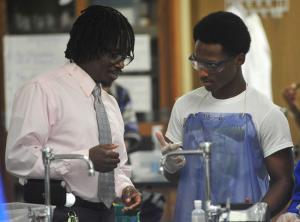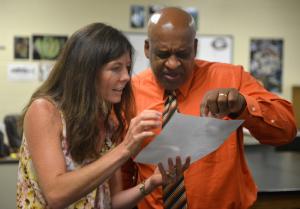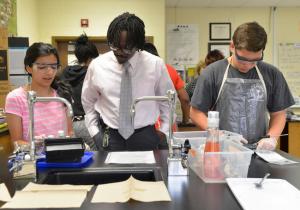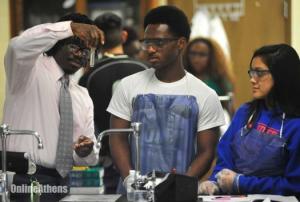Three young career changers are getting a competitive education at a Clarke County high school this school year, but the main beneficiaries might be students at Cedar Shoals High School.
The career changers are three Woodrow Wilson Teaching Fellows, who are learning how to teach. All are people with backgrounds or recent graduates in one of the so-called STEM fields (science, technology, engineering and mathematics), and each won a highly competitive fellowship from the Woodrow Wilson National Fellowship for the year’s training.
Each committed to work for three years in a school or schools, like Cedar Shoals, where the need is greatest for STEM teachers.
This is the first year the foundation awarded fellowships in Georgia.
Of Georgia’s 36 Wilson Teaching Fellows, 12 are enrolled in a special program created by Piedmont College’s School of Education. Its aim is to transform them from experienced professionals into highly trained teachers during an intense 12-month immersion period.
Three of the Piedmont fellows are at Cedar, nine at other northeast Georgia high schools.
 Each of the Fellows is paired with a veteran teacher. But they’re not like student teachers, said Cedar Shoals principal Tony Price. They come in as highly trained professionals, just not necessarily in teaching.
Each of the Fellows is paired with a veteran teacher. But they’re not like student teachers, said Cedar Shoals principal Tony Price. They come in as highly trained professionals, just not necessarily in teaching.
“They’ve shown expertise from day one,” he said. “They’re very hands-on and that’s exactly what we want.”
One Wilson fellow at Cedar, Damien Washington, left a career in public health to become a teacher. He wanted to provide a role model he seldom saw in his own school years – an African American male teacher.
Two weeks into the school year, Washington isn’t regretting his choice, and is already getting the kind of reinforcement that keeps many teachers going – moving a student from “I can’t do this” to knowing that they can.
“I believe I’m definitely in it for the duration,” said the 39-year-old.
Last week, in an environmental science class, students built model landfills using medium-sized containers filled with household trash. It’s a concrete way for students to learn about water quality, soil quality and solid waste disposal, explained Cedar teacher Cheryl Hudson.
Hudson and Washington moved from group to group, making sure they understood Thursday’s task, measuring phosphorus levels in the little landfills.
 “Right now we’re still in the acquisition of learning how to use the tools of a scientist,” said Hudson, who gave a high grade to Piedmont’s Wilson Fellow plan.
“Right now we’re still in the acquisition of learning how to use the tools of a scientist,” said Hudson, who gave a high grade to Piedmont’s Wilson Fellow plan.
The Wilson Fellows are in school the entire school year, so they get to watch and participate in the entire school year, including what teachers do from the very beginning, when they begin work in the days before students begin classes to plan for the upcoming school year.
“This is a very good, practical way to teach teachers,” Hudson said.
Actually, preparation for both Hudson and Washington began weeks before they reported to Cedar for the school year. The fellows got in some intensive instruction before the school year, and part of it was simply getting to know the teacher they’d be working with.
A second Wilson fellow, Brittany Ritter, didn’t set out to move to Georgia from Ohio, but isn’t complaining.
“So far, I love it,” said Ritter, who’s paired with chemistry teacher Mary Bradbury-Bailey.
Ritter learned of the fellowship program through a friend who’d participated, but when she applied, the deadline for the program in Ohio had already passed, she said. But having visited Atlanta a couple of times, she thought she’d give Georgia a try.
What surprised Ritter most, she said, was the positive energy in the school.
 “I was least prepared for how the administration is so receptive to the teachers here,” she said. “There’s a changing spirit in the air.”
“I was least prepared for how the administration is so receptive to the teachers here,” she said. “There’s a changing spirit in the air.”
That contrasted with what she had been used to in the Ohio schools she’d worked with before moving south.
“There it was like something dismal. People were disheartened,” said Ritter, 25, who studied pre-medicine at the University of Dayton.
Cedar’s third Wilson Fellow, Carly Chandler, brings a background in ecology and wildlife biology to the classes she’s essentially co-teaching with Cedar biology teacher Matthew Baker.
“It’s making me think it’s the way all teachers should be taught,” Chandler said.
It’s making Baker think it’s the way high school classes should be taught, too.
“It’s a lot easier to build relationships with kids,” Baker said. “When you do that, that’s when you can reach them.”
That positive energy Ritter feels is actually a reason why the Wilson Fellows are at Cedar Shoals, according to Julie Palmour, associate dean of education at Piedmont’s School of Education and the project director of the Woodrow Wilson Georgia Teaching Fellowship.
Piedmont is one of five colleges the Wilson Foundation signed up for the fellowship program.
Each of the five colleges or universities got a $400,000 grant from the foundation, but agreed to match that with a $400,000 in-kind contribution. At Cedar, that contribution includes extensive instruction for the Fellows outside the high school, and in-school support from two Piedmont College faculty members who spend up to 10 hours at the high school each week.
There’s a lot at stake for the college as well as the fellowship recipients; the training model Palmour and others built for the Wilson Fellows will help shape the college’s methods of training teachers in the future.
“Everything is about making sure that what we do works with these Fellows,” she said, “and ultimately how that translates into these kids (Cedar Shoals students) benefitting.”

